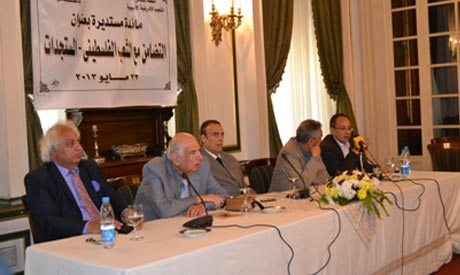
Experts discuss the fate of the Palestinian issue at a roundtable held at the Diplomats Club in Cairo (Photo: Nadeen Shaker)
The struggle for Palestinian rights has ground to an almost complete halt and is in need of a revamp. This was the message voiced by many experts at Wednesday's roundtable discussion in Cairo organised by the Afro-Asian Peoples’ Solidarity Organisation (AAPSO) and UNIC-Egypt.
Experts concurred that the Palestinian cause had been largely forgotten since the outbreak of the Arab Spring and transformations convulsing the region had failed to influence efforts to achieve justice for Palestinians.
During Egypt's 18-day uprising in early 2011, Palestine was rarely discussed among protesters in Tahrir Square and the issue failed to become part of the revolutionary discourse, Emad Gad, International Relations expert at the Ahram Centre for Political and Strategic Studies, said.
Gad said the cause was exploited, with almost every presidential hopeful using rhetoric about Palestine to win votes.
“In Egypt, Palestine remains important to people because it is charged with emotion,” Gad added.
Despite that, Gad claimed, the Palestinian struggle is fading from public discourse and has been tarnished by Hamas.
"The allegation that Hamas broke into Egyptian prisons [during the revolution] and was involved in kidnappings has had a huge effect on public opinion – the Palestinian people, in the minds of many Egyptians, is reduced to their view of Hamas," Gad added.
Moreover, Gad said, the presidency was wrong in its attempts reconcile Hamas and Fatah, a move that would open the door to a negotiating party that is not internationally recognised and is effectively a branch of the Muslim Brotherhood.
With the real peace process ending with the 2001 Taba Accords, there is little hope that Obama and Kerry’s efforts will amount to anything more than the Judaising of Israel, Hassan Asfour, former Palestinian Authority minister, said.
“Kerry has been pushing negotiations on the bilateral and multilateral levels. Both serve to pave the way for the Judaising of Israel,” Asfour said.
During President Obama’s visit to Tel Aviv, he emphasised the Jewish identity of Israel, which he said Arabs and Palestinian must learn to recognise.
The Arab League, which was formed in 1945 with the goal of liberating Palestine, has also fallen short.
Speaking at the roundtable, Egyptian journalist Amin Mohamed Amin said the decisions made by the league regarding Palestine were "never acted upon."
“The Arab League never takes action. That is because it is an institution of governments, rather than of people,” he said.
Samir Ghattas, a Palestinian political analyst and speaker at the roundtable, said 50 percent of Palestinians did not feel properly represented by any political faction.
Ghattas believes in the wholesale overhaul of Palestinian political parties. He argued that their main problem is the decades-long exploitation of the Palestinian leadership by Arab states.
Palestinian factions and parties, he added, must rid themselves of this long-standing interference in their affairs.
Ghattas said there were three solutions to the Palestine issue.
First, a regional solution in which the Gaza Strip is ceded to Egypt and the West Bank to Jordan. Ghattas claimed this was being planned by Egypt's Muslim Brotherhood.
Second, a two-state solution, which is currently hampered by half a million Jewish settlers in the West Bank.
And third, a "bi-national state," which is made less likely by the failure of both sides to engage with each other.
Short link: